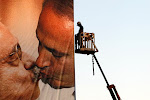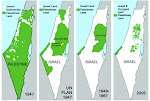Shoah and Tell - an Arab's Holocaust Museum
As the sirens wail for Holocaust Remembrance Day and the Israeli diplomatic corps urges the world to remember and never permit such atrocities to happen again, one Arab lawyer takes history lessons about the Holocaust out to the Palestinian people. Khaled Kasab Mahameed faces opposition from Holocaust deniers, but still he persists with his quixotic mission: traveling to the West Bank to educate Palestinians about the Shoah, the final solution, the Holocaust.
Many Palestinians have never heard that the Nazis killed 6 million Jews during Word War II — it doesn't rate a mention in their school history books. Others deny that the Holocaust ever happened. According to this blinkered reasoning, the Jews are fighting Palestinians over their homeland, and they cannot afford to have sympathy for their enemy. Mahameed sees this view as tragically misguided. He says:
The key to the Palestinians achieving their own goals is to understand the Holocaust, and the place it holds in the Israeli psyche and its obsession with security.
Mahameed passes around a death-camp photo of a Jewish inmate standing over a mass grave full of naked corpses. The room of Palestinians falls silent. "That man, that survivor, in the photograph came to Israel. Can you imagine the nightmares, the horrors that he brought with him? It's a suffering that nobody, even us Palestinians, can begin to comprehend," he says with quiet, lawyerly persistence. The photo moves around the room, again and again, in silence. Finally, a retired Palestinian general, Abdul Latah Solimia, once captive in an Israeli military prison in Lebanon says: "As a militant, I know the cost of war and hatred. For 60 years, we have tried to eliminate each other, and neither has won. We Israelis and Palestinians should share this land."
Mahameed's obsesison with teaching Arabs about the Holocaust occurred four years ago, when he took his two children to see the massive 20-foot high concrete wall that Israel has erected around parts of Jerusalem to keep out Palestinians. It is so high in places that it seems to sever half the blue sky. "I told my son to break off a piece of the wall as a souvenir. It was very difficult, and while he was trying, I asked myself, what would drive the Israelis to do such a thing to us, build such a monstrosity as this wall?" He gathered his son and daughter and drove them to Yad Vashem, the Holocaust museum. "It was very moving. I couldn't breathe. Six million. It's like something off another planet," he recalls.
Touring the somber museum, it occurred to Mahameed that "we Palestinians are the victims of the terrible things that were inflicted on the Jews by the Holocaust." The images of the crimes perpetrated against the Jews of Europe also made him understand international support for Israel. "If an Israeli child dies from a Gaza rocket, the Israelis can take a photo of that child to America and them about 1.5 million Jewish children who died in the death camps, and Israelis will be given more money and weapons to use against us," he says. Most Israelis experience the same images of a Gaza rocket attack in the exterminationist frame of Auschwitz, not simply as a product of the Israeli-Palestinian conflict over land.
Using photos donated by Yad Vashem and images from the Naqba — the "Catastrophe," which is how Palestinians refer to the events surrounding Israel's independence, which left thousands of Palestinians in exile and in refugee camps — the lawyer set up a one-room museum in his hometown of Nazareth, called the Arab Institute for Holocaust Research and Education. Every week, he travels to towns, villages and refugee camps in the West Bank trying to enlighten his fellow Palestinians. Says Mahameed, "Even with the militants, when I explain to them that Israel's brutal policies in the Palestinian territories stem from the Holocaust, they tell me 'You're bringing us an atomic bomb. We need to think about this.'"
Sometimes, his message is greeted with hostility — even in his own family. Mahameed has been ostracized by his brothers, who say that his obsession with the Holocaust is tantamount to sympathizing with Israel. False rumors that he is secretly on Israeli payroll dog him.
On the Israeli side, there is incomprehension, too. Yad Vashem staffers question his agenda." Replies Mahameed: "They don't want us Palestinians to have pity on them. They only want to show us how mighty they are."
Mahameed is an avid believer in Mahatma Gandhi's dictum that truth leads to non-violence, and he sees himself practicing a kind of ju-jitsu, using Israel's own moral superiority over the Holocaust as a way to shame the Israeli 'occupiers' in the West Bank into more humane treatment for the Palestinians. "If the Israelis believe that the Holocaust justifies this kind of brutal discrimination, then they're wrong."
He travels through army checkpoints showing his ID card and a photo from Auschwitz. At first he's met with suspicion. "I tell the soldiers that this could be a photo of their grandfather, and that I understand that they, as Jews, are unique victims. But the paradox is that we Palestinians have the Holocaust on our shoulders, too."
Hat tip to TIME magazine

























